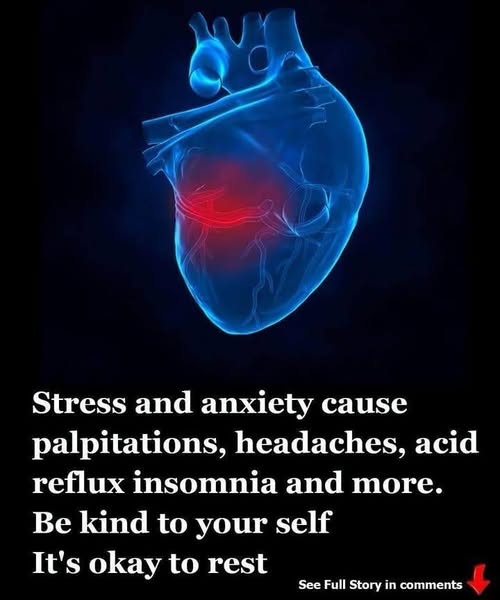
In today’s fast-paced world, stress and anxiety have become almost constant companions for many of us. But while we often brush them off as “just part of life,” their impact on the body runs deep — and can quietly cause serious damage over time.
If you’ve been feeling overwhelmed lately, it’s important to understand how chronic stress affects your health and, more importantly, how you can start being kinder to yourself. Because healing starts with awareness — and small, meaningful changes.
The Silent Damage of Chronic Stress
Stress is a natural response to challenging situations. When faced with a threat, your body releases hormones like adrenaline and cortisol, preparing you to “fight or flee.” In short bursts, this reaction is life-saving.
But when stress becomes chronic — lingering for days, weeks, or even months — it stops being helpful and starts harming your body in profound ways.
Chronic stress can:
-
Disrupt your immune system: Making you more vulnerable to infections and illnesses.
-
Raise blood pressure: Increasing your risk for heart disease and stroke.
-
Cause digestive problems: Stress can trigger stomachaches, bloating, and even worsen conditions like IBS.
-
Interfere with sleep: Leading to insomnia or poor-quality rest, which only worsens emotional and physical health.
-
Contribute to weight gain: By disrupting hormones that regulate hunger and fat storage.
-
Affect mental health: Anxiety, depression, irritability, and feelings of helplessness often follow.
Essentially, untreated stress doesn’t just impact your mood — it slowly chips away at your overall well-being.
How Anxiety Compounds the Problem
While stress typically comes from external sources (like work deadlines or relationship struggles), anxiety is often an internal experience — an ongoing feeling of dread or worry, even without a clear cause.
When anxiety joins forces with stress, the effects are even more intense. Your body remains in a near-constant state of tension, and your mind races through worst-case scenarios. Over time, this can exhaust your nervous system and deplete your mental resilience.
Recognizing the Signs
Sometimes, the body gives us clear signals that stress and anxiety are taking a toll — we just need to listen.
Common warning signs include:
-
Chronic headaches or migraines
-
Muscle tension, especially in the neck and shoulders
-
Rapid heartbeat or chest pain
-
Changes in appetite (overeating or loss of appetite)
-
Frequent illnesses due to a weakened immune system
-
Mood swings, irritability, or feeling “on edge” constantly
-
Difficulty concentrating or making decisions
-
Feeling tired all the time, even after sleeping
If these symptoms sound familiar, it’s time to hit pause and prioritize your well-being.
How to Be Kinder to Yourself
The good news? You don’t have to accept stress and anxiety as your permanent reality. There are simple, effective ways to be gentler with yourself — physically, mentally, and emotionally.
1. Set Boundaries
Learn to say “no” when needed. Overcommitting your time and energy leaves you drained. Respecting your own limits is not selfish — it’s essential for maintaining balance.
2. Practice Deep Breathing
It sounds simple, but mindful breathing can work wonders. Taking slow, deep breaths activates your parasympathetic nervous system, signaling your body that it’s safe to relax.
Even just five minutes a day of focused breathing can reduce anxiety and lower your heart rate.
3. Move Your Body
Exercise is a natural stress-buster. It releases endorphins (your brain’s feel-good chemicals) and helps burn off built-up tension.
You don’t have to run a marathon — a brisk walk, dancing to your favorite song, or stretching in your living room all count.
4. Get Enough Sleep
Stress and poor sleep feed off each other in a vicious cycle. Create a bedtime routine that promotes relaxation: dim the lights, put away screens an hour before bed, and try calming activities like reading or meditation.
Aim for 7–9 hours of restful sleep every night to give your body time to repair and recharge.
5. Nourish Yourself
Food affects mood. Eating a balanced diet rich in fruits, vegetables, whole grains, lean protein, and healthy fats can stabilize blood sugar and support brain health.
Avoid excess caffeine, alcohol, and sugar, which can spike anxiety and energy crashes.
6. Talk About It
Bottling up your worries only gives them more power. Reach out to a trusted friend, family member, or therapist. Talking openly about your feelings can lighten the load and help you see solutions more clearly.
You are not alone, and seeking help is a sign of strength, not weakness.
7. Practice Self-Compassion
You won’t eliminate stress overnight — and that’s okay. Celebrate small wins, forgive yourself for bad days, and treat yourself with the same kindness you would offer a dear friend.
Remember: You are doing the best you can, and that’s enough.
The Road to Healing
Life will always have its ups and downs, but chronic stress and anxiety don’t have to control you. By taking small, consistent steps toward self-care, you can strengthen your resilience, boost your health, and rediscover a sense of calm.
Start today. Your mind, body, and soul will thank you for it.





